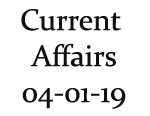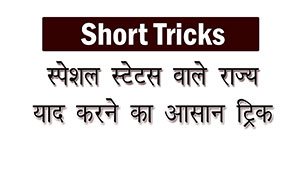-
Current Affairs 4th January 2019
Updated : 04-Jan-2019
Current Affairs 4th January 2019 - Important Points
- Heritage conservation in Indian Railways started by - The Ministry of Railways
- Aadhaar modification Bill presented in - Lok Sabha
- The cases of Malaria minimised by - Odisha
- Paper Sensor to detect freshness of Milk by - IIT Researchers
- Bill to make marital rape a crime presented in - Lok Sabha
- Cabinet approves first-ever three-way merger in Indian Banking merger of Vijaya Bank, Dena Bank & Bank of Baroda on - 2nd January 2019
Current Affairs 4th January 2019 - Details
Heritage conservation in Indian Railways started by - The Ministry of Railways
The Ministry of Railways has started several steps to encourage heritage conservation. The conservation measures undertaken by railways consists of a revival of Steam Engines, up-keeping Hill Railways, a special delegation of powers to Divisions for promoting Hill & Steam tourism, consolidating Railway museums, preservation of built heritage, digitization of Railway Heritage &bringing it online for universal access etc.
Measures undertaken for Heritage conservation- Zonal Railways is organising drives time to time for identification & preservation of Railway heritage properties like buildings, bridges, rolling stocks, documents, photographs, artefacts, tools, clocks, benches etc, which currently lying unnoticed at different locations.
- A specific provision was ended by the Ministry of Railways in the budget for 2018-19 for the revival of steam engines including restoration & gaining of spares.
- A weekly timetabled train on steam traction has been planned operational between Garhi Harsaru & Farukhnagar.
- Maintenance of 5 hill railways of India including Darjeeling Himalayan Railway, Nilgiri Mountain Railway, Kalka Shimla Railway, Matheran Light Railway & Kangra Valley Railway are undertaken according to the codal provision of Indian Railways & UNESCO Guiding principle.
- Special powers have been substituted to Divisional Railway Managers of 5 hill railways for promoting tourism in these 5 hill railways.
Aadhaar modification Bill presented in - Lok Sabha
The government has presented the Aadhaar modification bill in Lok Sabha. The bill goals to provide legal
support for voluntary seeding of biometric Aadhaar identity card for mobile SIM card & bank account authentication purposes.
Features of the Bill- The bill pursues to amend the Aadhaar- Targeted Delivery of Financial & Other Subsidies, Benefits & Services Act, 2016, the Indian Telegraph Act, 1885 & the Prevention of Money-laundering Act, 2002.
- The modification allows children, who would turn 18 years old, to choose out of the system.
The modifications make sharing of Aadhaar details voluntary for starting bank accounts, school
admissions & getting mobile SIM cards. - The bill provides for rigid penalties for violation of norms set for the usage of Aadhaar.
- The modification bill prohibits storing of core biometric information and Aadhaar number by service providers in cases of persons who have voluntarily offered the national ID as a means of authentication.
- The bill makes it transparent that anyone not offering Aadhaar cannot be left without any service, be it a bank account or a SIM card.
- The bill initiates the process for offline verification of an Aadhaar number bearers & confers improved regulator-like power on UIDAI to give instructions as it may consider essential to any entity in the Aadhaar ecosystem.
The cases of Malaria minimised by - Odisha
Odisha is highly susceptible for malaria & bears almost a quarter of the nation’s disease burden. Through its ground-breaking methods involving non-health workers in malaria control, Odisha was able to minimise the number of cases by 80 percent.
Efforts
- The battle of Odisha has resulted in the decrease in the number of cases. Approximately, 444850 cases of malaria in 2016 in the State & it fell to about 55360 till October 2018. Deaths were also minimised from 77 in 2016 to 4 in 2018.
- Odisha attained this noteworthy achievement via additional investments were provided for the Indian Council of Medical Research under the Comprehensive Case Management Program to experiment with the interventions needed.
- Challenges for instance, unavailability of medicines when roads get cut off due to heavy rain, or health workers fronting difficulty in reaching remote villages when jammed by elephants, were addressed.
- Alternative providers including teachers, forest animators were trained to accomplish mass screening by running blood tests & delivering medicines to villagers in the areas where ASHA workers were unable to reach.
- Districts were segregated into a control block & an intervention block, grounded on instances of malaria under the Case Management Programme & activities were intensified while in the control block things went on as usual.
- People were screened even if they had no indications of malaria in hill-top areas. If their blood indicated the presence of parasites, they were treated with anti-malarial medicines.
Paper Sensor to detect freshness of Milk by - IIT Researchers
Researchers from the IIT, Guwahati, have developed a paper kit to assess the freshness of milk &
determine how well the milk has been pasteurized. The kit can also help in ensuring that milk is used
before it turns too sour with the aid of a smartphone app.
Kit Efficiency- The Kit utilises an ordinary filter paper to formulate the detector. The filter paper which is cut into small pieces, is saturated with chemical probes that preferentially react with Alkaline Phosphatase, which is a pointer of the quality of the milk.
- When the filter paper saturated with probes in contact with the milk, its colour shows variations.
- The colour variation is photographed by a Smartphone.
- The images are then managed to obtain corresponding colour values. These values are then equated with standard information stored in the phone.
- This delivers data about the quality of the Milk. Since the sensors utilised works in both qualitative & quantitative mode, the kit can also be utilised to calculate the quantity of the milk.
Kit - The probe discs are connected to a 2cm square clear cellulose acetate film.
- Another layer cellulose acetate covering is coated as cover on the probe. The milk is injected via the tiny hole on the cover.
- The colour variation is photographed & processed using a smartphone to get the results.
Bill to make marital rape a crime presented in - Lok Sabha
A private bill named the Females's Sexual, Reproductive & Menstrual Rights Bill 2018 has been introduced in the Lok Sabha by Congress MP Dr.Shashi Tharoor. The bill suggests to make marital rape a crime & gives more decisional autonomy to females in termination of pregnancy.
Key Provisions of the Bill
The bill suggests the deletion of exception 2 to Section 375 of IPC, which explains that sexual intercourse by a man with his own wife is not rape.
The bill also enhances a provision to explanation 2 that ‘the females’ ethnicity, religion, caste, education,
occupation, clothing, entertainment preference, social circle, personal opinion, previous sexual conduct/any other concerned grounds shall not be a reason to believe her consent to the sexual activity.
Abortion rights- The bill suggests alterations to the Medical Termination of Pregnancy Act 1971.
- The bill recommends renaming of the act to Legal Termination of Pregnancy Act.
- The modification of name of the act has been anticipated on the ground that the use of the word medical in the title of the Bill formed ambiguity, which mainly obstructed rural areas as the doctors there feared to interpret the law in case of an arrest under Section 312 of the IPC.
- The bill grants females an absolute right to removal of pregnancy where they may terminate pregnancy merely by appeal until the 12th week of pregnancy.
- The bill also allows females the conditional right to terminate their pregnancy until the 20 weeks of pregnancy.
- The pregnancies resulted due to rape/failure of birth control methods are considered to constitute a grave injury to the mental health of a female.
- The bill also allows a limited right of abortion until the 24-week of pregnancy.
- The Act partial termination of pregnancy to the 20-week of pregnancy unless the existence of the woman was at risk.
Cabinet approves first-ever three-way merger in Indian Banking merger of Vijaya Bank, Dena Bank & Bank of Baroda on - 2nd January 2019
The Union Cabinet, led by PM Narendra Modi, on January 2nd, 2019 sanctioned the “Scheme of Amalgamation” for union of Bank of Baroda, Vijaya Bank & Dena Bank. The unification will be the 1st-ever 3-way consolidation of banks in India. The union of Bank of Baroda, Dena Bank & Vijaya Bank was projected by the Union Finance Ministry on September 17th, 2018.
Crucial Highlights of the Unification- Vijaya Bank & Dena Bank are the Transferor Banks & the Bank of Baroda is the Transferee Bank and the ‘Scheme of Amalgamation’ will come into existence on April 1st, 2019.
- The undertakings of the transferor banks will be shifted to the transferee bank, including all business, assets, rights, titles, claims, licenses, sanctions & all property, all borrowings, liabilities & obligations.
- Every permanent ®ular employee of the transferor banks will become an employee of the transferee bank.
- The pay & stipends offered to the employees of transferor banks shall not be least favourable as compared to what they are getting in their respective transferor banks.
- The Board of the transferee bank, that is Bank of Baroda, will make sure that the interests of all transferring employees of the transferor bank are protected.
- The transferee bank will release shares to the stakeholders of transferor banks according to the share exchange ratio.
- Stakeholders of the transferee bank & transferor bank shall be allowed to raise their complaints, if any, in concerned to the share exchange ratio, via an expert committee.














